高一英语上学期第三单元知识点总结
高一新教材英语第三单元知识点详解
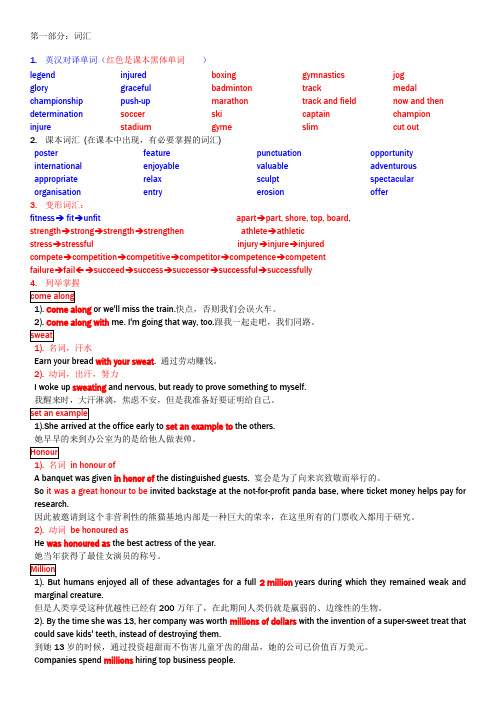
第一部分:词汇1.英汉对译单词(红色是课本黑体单词)legendglory championship determination injure injuredgracefulpush-upsoccerstadiumboxingbadmintonmarathonskigymegymnasticstracktrack and fieldcaptainslimjogmedalnow and thenchampioncut out2.课本词汇(在课本中出现,有必要掌握的词汇)poster international appropriate organisation featureenjoyablerelaxentrypunctuationvaluablesculpterosionopportunityadventurousspectacularoffer3.变形词汇:fitness→ fit→unfit apart→part, shore, top, board,strength→strong→strength→strengthen athlete→athleticstress→stressful injury→injure→injuredcompete→competition→competitive→competitor→competence→competentfailure→fail←→succeed→success→successor→successful→successfully4.列举掌握come along1). Come along or we'll miss the train.快点,否则我们会误火车。
2). Come along with me. I'm going that way, too.跟我一起走吧,我们同路。
sweatEarn your bread with your sweat. 通过劳动赚钱。
高一教材英语第三单元知识点详解
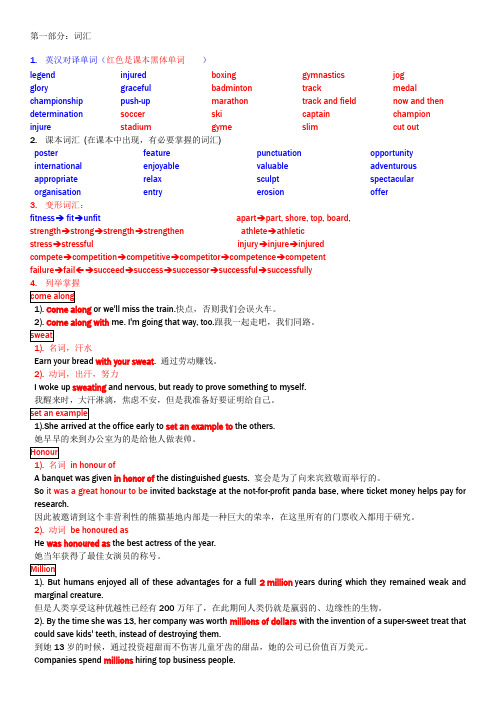
第一部分:词汇1.英汉对译单词(红色是课本黑体单词)legendglory championship determination injure injuredgracefulpush-upsoccerstadiumboxingbadmintonmarathonskigymegymnasticstracktrack and fieldcaptainslimjogmedalnow and thenchampioncut out2.课本词汇(在课本中出现,有必要掌握的词汇)poster international appropriate organisation featureenjoyablerelaxentrypunctuationvaluablesculpterosionopportunityadventurousspectacularoffer3.变形词汇:fitness→ fit→unfit apart→part, shore, top, board,strength→strong→strength→strengthen athlete→athleticstress→stressful injury→injure→injuredcompete→competition→competitive→competitor→competence→competentfailure→fail←→succeed→success→successor→successful→successfully4.列举掌握come along1). Come along or we'll miss the train.快点,否则我们会误火车。
2). Come along with me. I'm going that way, too.跟我一起走吧,我们同路。
sweatEarn your bread with your sweat. 通过劳动赚钱。
高一英语第3单元知识点
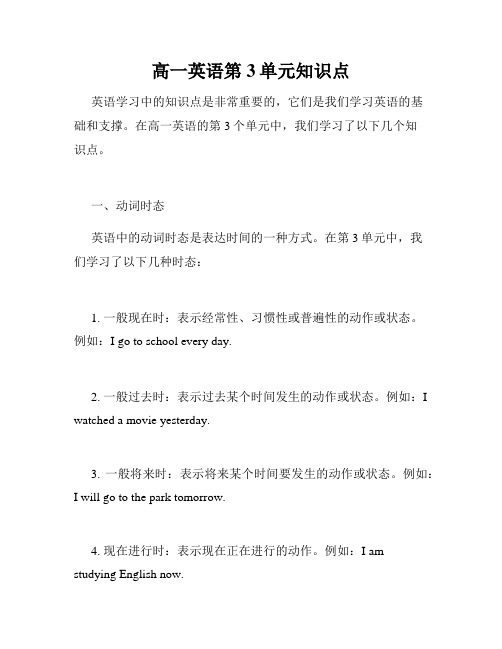
高一英语第3单元知识点英语学习中的知识点是非常重要的,它们是我们学习英语的基础和支撑。
在高一英语的第3个单元中,我们学习了以下几个知识点。
一、动词时态英语中的动词时态是表达时间的一种方式。
在第3单元中,我们学习了以下几种时态:1. 一般现在时:表示经常性、习惯性或普遍性的动作或状态。
例如:I go to school every day.2. 一般过去时:表示过去某个时间发生的动作或状态。
例如:I watched a movie yesterday.3. 一般将来时:表示将来某个时间要发生的动作或状态。
例如:I will go to the park tomorrow.4. 现在进行时:表示现在正在进行的动作。
例如:I am studying English now.5. 过去进行时:表示过去某个时间正在进行的动作。
例如:I was reading a book when she called.6. 现在完成时:表示过去某个时间发生的动作对现在造成的影响或结果。
例如:I have finished my homework.二、名词的单复数名词的单复数形式是英语中的重要内容之一。
在第3单元中,我们学习了以下几种名词的变化规则:1. 一般情况下,名词的复数形式是在词尾加上-s。
例如:book-books, pen-pens.2. 以s、x、sh、ch等音结尾的名词,其复数形式是在词尾加上-es。
例如:class-classes, box-boxes.3. 以辅音加y结尾的单词,将y变为i,再加-es。
例如:baby-babies, city-cities.4. 以f或fe结尾的名词,其复数形式一般将f或fe变为v,再加上-es。
例如:knife-knives, leaf-leaves.5. 有些名词的复数形式不规则,需要特殊记忆。
例如:man-men, woman-women.三、连词连词是连接词与词、词与短语、句子与句子之间的词语。
人教高一英语上册第3单元知识点归纳总结
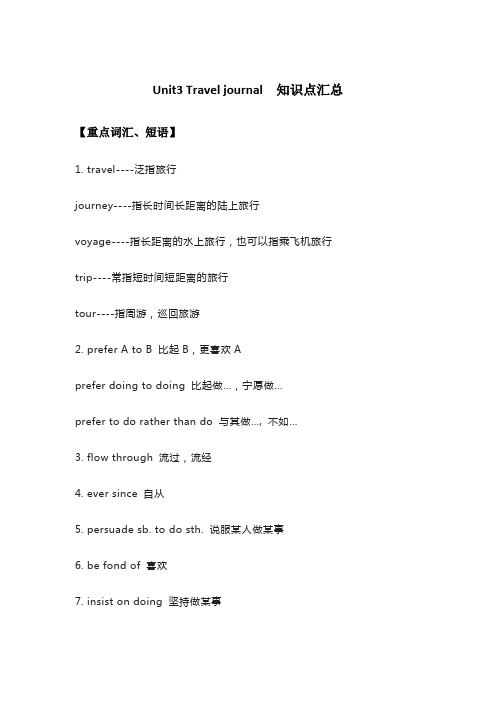
Unit3 Travel journal 知识点汇总【重点词汇、短语】1. travel----泛指旅行journey----指长时间长距离的陆上旅行voyage----指长距离的水上旅行,也可以指乘飞机旅行trip----常指短时间短距离的旅行tour----指周游,巡回旅游2. prefer A to B 比起B,更喜欢Aprefer doing to doing 比起做…,宁愿做…prefer to do rather than do 与其做…, 不如…3. flow through 流过,流经4. ever since 自从5. persuade sb. to do sth. 说服某人做某事6. be fond of 喜欢7. insist on doing 坚持做某事insist + that 从句(用should+ V原)8. care about 关心9. change one’s mind 改变想法10. altitude 高度attitude 态度,看法11. make up one’s mind to do下定决心做某事= decide to do = make a decision to do12. give in 让步,屈服give up 放弃13. be surprised to…对…感到惊奇to one’s surprise 令某人惊讶的是…14. at last = finally = in the end 最终15. stop to do 停下来去做某事stop doing 停止做某事16. as usual 像往常一样17. so…that 如此…以至于…so + adj + a/an + n. + thatsuch + a/an +adj. + n. + that18. be familiar with 对…熟悉(人作主语)be familiar to 为…所熟悉(物作主语)【重点句型】1. My sister and I have dreamed about cycling along the Mekong River from where it begins to where it ends. 我姐姐和我一直梦想要沿湄公河从源头到终点骑车旅行。
高一英语上 (Unit3. A taste of travel 基础知识梳理 )
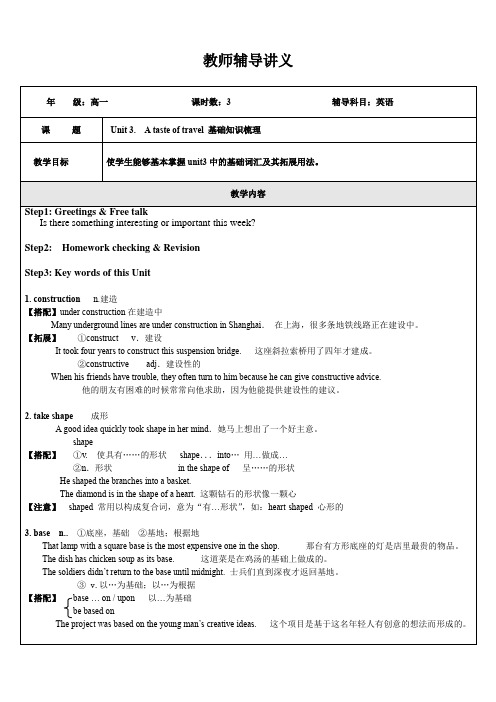
教师辅导讲义A. can …can'tB. may . . . may notC. must ... mustD. could ... couldn't5. When _______the forest fire which lasted three weeks out?A. did; putB. has; putC. has; been putD. was; put6. Our school, which _______in 1898, is one of the oldest schools in Shanghai.A. foundB. was foundC. was foundedD. founded7. The news that volunteer workers will go to homes for the aged ________now.A. is being talked aboutB. are being talked aboutC. is being talkedD. are being talked8. —Shall I go and get Dr Brown?—No, he_______.A. has been sent forB. had been sent forC would be sent for D. is sent for9. The last time when we passed by, many old houses_______.A. has been pulled downB. are being pulled downC. were being pulled downD. would be pulled down10. The Great Wall snakes over the mountain chains, and is regarded as one of the most beautiful tourist _______in the world.A. interestsB. attractionsC. placesD. directions11. Traditional values and cultures have been _____ well in some parts of our country.A. preservedB. savedC. involvedD. preventedI2. A man's dreams can only be a _____ of his sub consciousness .A. shapeB. reflectionC. sceneryD. view13.The cost of the material is _______in the bill for the work.A. heldB. includedC. keptD. packed14. He suddenly _______off the bicycle and luckily he was not injured.A. fellB. fallenC. falledD.felled15. If you climb up the peak of the mountain, you can enjoy a superb _____ of the city.A. sightB. viewC. sceneD. landscape16. The flowers in the garden look_______and smell _______A. wonderful; sweetB. nice; badlyC. beautiful; betterD. good; well17. Professor White has written some stories, but he is_____ known for his plays.A. the bestB. moreC. betterD. the most18.—How often do you go to the library?---- _____________A. In two daysB. Every few daysC. Each third dayD. After a few days19. It was difficult for me to____ the final conclusion at once.A. comeB. drawC. reachD. arrive20. His eyes shone brightly when he finally received the magazine he_______.A. had long been expectedB. had long expectedC. has long expectedD. was long expected***************************************************************************************************** Keys: 1. DBDA D 6—10 CAACB 11—15 ABBAB 16—20 ACBBBSection B:Fill in the blanks with suitable words or phrases from the list given below. Change the form where necessary.2. The investor has decided to abandon the project.3. It is said that he has been admitted to a university without taking the national entrance examinations.4. The tourists were attracted by the scenery of Li River.5. The construction of the Potala Palace is a wonder.6. Students must have access to good books.7. Standing on the top of the hill, we can overlook the whole village.8. In very hot summer, the most effective way to preserve food is to leave food in the refrigerator.Step5: 每课一练AOf all systems of symbols, language is the most highly developed. It has been pointed out that human beings, by agreement, can make anything stand for anything. Human beings have agreed, in the course of centuries of mutual(相互的) dependency, to let the various noises that they can produce with their lungs, throats, tongues, teeth, and lips systematically stand for certain happenings in their nervous system. We call that system of agreements language.There is no necessary connection between the symbol and that which it stands for. Just as social positions can be symbolized by feathers worn on the head, by gold on the watch chain, or by a thousand other things according to the culture we live in, so the fact of being hungry can be symbolized by a thousand different noises according to the culture we live in. However obvious these facts may appear at first glance, they are actually not so obvious as they seem except when we take special pains to think about the subject. Symbols and the things they stand for are independent of each other, yet we all have a way of feeling as if, and sometimes acting as if, there were necessary connections. For example, there are people who feel that foreign languages are unreasonable by nature-, foreigners have such funny names for things, and why can't they call things by their right names? This feeling exhibits itself most strongly in those English and American tourists who seem to believe that they can make the natives of any country understand English if they shout loud enough. Like the little boy who isreported to have said: " Pigs are called pigs because they are such dirty animals," they feel thatthe symbol is inherently (内在的) connected in some way with the things symbolized.()19. Language is a highly developed system of symbols because human beings_______________ .A.have made use of language for centuriese our nervous system to support languageC.have made various noises stand for any eventsD.can make anything stand for anything by agreement.( )20. What can we conclude from Paragraph 2?A.Different noises may mean different things.B.Our culture determines what a symbol stands for.C.The language we use symbolizes our social positions.D.Our social positions determine the way we are dressed.()21. In Paragraph 3, the underlined words "take special pains" probably means .A. try very hardB. take our timeC.are very unhappyD. feel especially painful()22. The example of the little boy is used to show that_________________ .A.adults often learn from their youngB."pig" is a dirty word because pigs are dirtyC.words are not connected with the things they stand forD.people sometimes have wrong idea about how language worksBThe greatest recent changes have been in the lives of women. During the twentieth century there was an unusual shortening of the time of a woman's life spent in caring for children. A woman marrying at the end of the 19th century would probably have been in her middle twenties, and would be likely to have seven or eight children, of whom four or five lived till they were five years old. By the time the youngest was fifteen, the mother would have been in her early fifties and would expect to live a further twenty years, during which custom, chance and health made it unusual for her to get paid work. Today women marry younger and have fewer children. Usually a woman's youngest child will be fifteen when she is forty-five and is likely to take paid work until retirement at sixty. Even while she has the care of children, her work is lightened by household appliances(家用电器) and convenience foods.This important change in women's way of life has only recently begun to have its full effect on women's economic position. Even a few years ago most girls left school at the first opportunity and most of them took a full-time job. However, when they married, they usually left work at once and never returned to it. Today the school-leaving age is sixteen, many girls stay at school after that age, and though women tend to marry younger, more married women stay at work at least until shortly before their first child is born. Many more after wads, return to full or part-time work. Such changes have led to a new relationship in marriage, with both husband and wife accepting a greater share of the duties and satisfaction of family life, and with both husband and wife sharing more equally in providing the money and running the home, according to the abilities and interest of each of them.()23. We are told that in an average family about 1990 .A.many children died before they were fiveB.the youngest child would be fifteenC.seven of eight children lived to be more than fiveD.four or five children died when they were five()24. When she was over fifty, the late 19th century mother___________________ .A.would expect to work until she diedB.was usually expected to take up paid employmentC.would be healthy enough to take up paid employmentD.was unlikely to find a job even if she is now likely()25. Many girls, the passage says, are now likely to ___________________ .A.marry so that they can get a jobB.leave school as soon as they canC.give up their jobs for good after they are marriedD.continue working until they are going to have a baby( )26. According to the passage, it is now quite usual for women to____________________ .A.stay at home after leaving schoolB.marry men younger than themselvesC.start working again later in life。
人教版本高中高一英语上册的Unit3学习知识点总结计划.doc

人教版高一英语上册 Unit3知识点总结一、知点1.preferprefer doing to talking 喜做而不喜Which of these two dresses do you prefer? 两套衣服你喜哪一套 ?I prerer to go to America for my fruther study. 我更愿意去美国修学。
Anne prefers me to replace her at the meeting. 安妮更愿意我代替她去参加会。
2. advantages and disadvantages 劣3. How do they make use of it in their daily life? 在日常生活中他是如何利用它的4.flow through 流,流5.Ever since middle school, my sister Wang Wei and I havedreamed about taking a great bike trip. 从高中起,我姐姐王和我就一直梦想做一次大的自行旅行。
since 引的状从句用一般去,介since 与表示去某一点的用,副since 后不用从句或。
It is/has been+ 一段 +since+ 一般去 ( 从句中的作不能延 )自从⋯⋯至今已多久了。
since then 自从那至今 ever since 从那以后一直6.persuade sb to do sth= persuade sb into doing sth服某人做某事He persuaded her to go to school, even though she did notwant to. 即使她不想去上学,他是服她去。
7.After graduating fro college, we finally got the chance totake a bike trip.大学以后,我于有了机会自行旅行。
高一英语unit3知识点

高一英语unit3知识点高一英语Unit 3 知识点英语学习在高一阶段对于学生来说非常关键,而Unit 3更是其中一个重要的单元。
在这个单元中,学生将学习到一些关于健康和生活方式的话题,以及相关的词汇、语法和表达方式。
本文将以以下几个方面来论述Unit 3的知识点:一、词汇与短语Unit 3中的词汇与短语包括了很多与健康和生活方式相关的概念。
例如,学生会学习到一些表示食物的词汇,如fruit(水果)、vegetable(蔬菜)、meat(肉类)等。
同时,还会学习到一些与运动和锻炼相关的词汇和短语,如exercise(锻炼)、keep fit(保持健康)等。
掌握这些词汇和短语有助于学生更好地进行英语交流,并能够表达自己的观点和建议。
二、语法在Unit 3中,学生将会学习到一些与情态动词相关的语法知识。
情态动词包括can、may、should等,它们在句子中多用来表示能力、许可和建议等。
学生需要了解这些情态动词的用法,并能够灵活运用它们来表达自己的意思。
例如,当谈论健康问题时,可以用should来给出建议,如"You should eat more vegetables and exercise regularly."三、阅读与听力在Unit 3的学习中,学生还需要进行一些阅读和听力练习。
阅读和听力可以帮助学生提高听力和阅读理解的能力,同时也能够帮助他们更好地理解课文中的内容。
例如,学生可以通过阅读文章了解一些关于健康饮食和运动的知识,并能够回答相关的问题。
而通过听力练习,学生可以提高自己的听力水平,并培养对不同口音和语速的适应能力。
四、口语与写作在Unit 3的学习中,学生需要进行一些口语和写作练习。
口语练习可以帮助学生提高口语表达能力,并能够更好地应对与健康和生活方式相关的话题。
例如,学生可以与同学们进行讨论,谈论自己的健康习惯和生活方式,并互相提供建议。
此外,写作练习也是学生提高英语写作能力的重要途径。
高一上英语三单元知识点
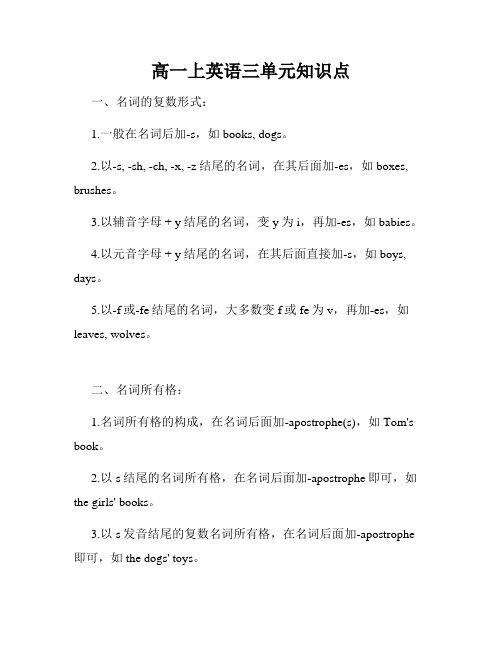
高一上英语三单元知识点一、名词的复数形式:1.一般在名词后加-s,如books, dogs。
2.以-s, -sh, -ch, -x, -z结尾的名词,在其后面加-es,如boxes, brushes。
3.以辅音字母 + y结尾的名词,变y为i,再加-es,如babies。
4.以元音字母 + y结尾的名词,在其后面直接加-s,如boys, days。
5.以-f或-fe结尾的名词,大多数变f或fe为v,再加-es,如leaves, wolves。
二、名词所有格:1.名词所有格的构成,在名词后面加-apostrophe(s),如Tom's book。
2.以s结尾的名词所有格,在名词后面加-apostrophe即可,如the girls' books。
3.以s发音结尾的复数名词所有格,在名词后面加-apostrophe 即可,如the dogs' toys。
三、形容词的比较级和最高级:1.单音节形容词和部分双音节形容词,比较级在词尾加-er,最高级在词尾加-est,如long, longer, longest。
2.以字母e结尾的形容词,比较级在词尾加-r,最高级在词尾加-st,如nice, nicer, nicest。
3.部分双音节和多音节形容词,在前面加more (比较级)或most (最高级),如expensive, more expensive, most expensive。
四、动词的时态和语态:1.一般现在时:主语 + 动词原形。
如I study English every day.2.一般过去时:主语 + 动词过去式。
如She danced at the party last night.3.一般将来时:主语 + will + 动词原形。
如They will visit their grandparents next week.4.现在进行时:主语 + am/is/are + 现在分词。
